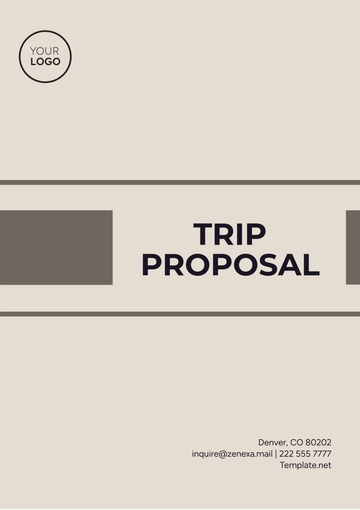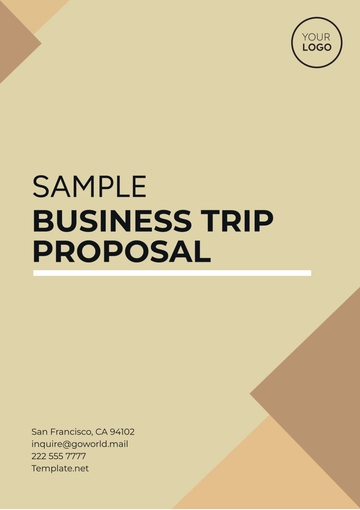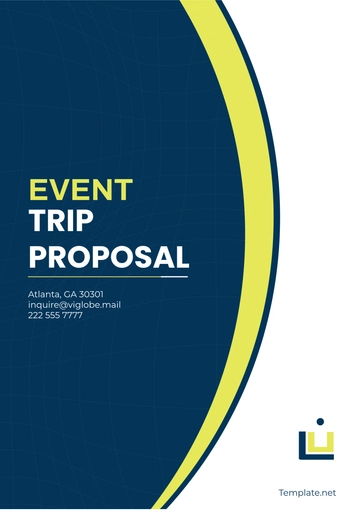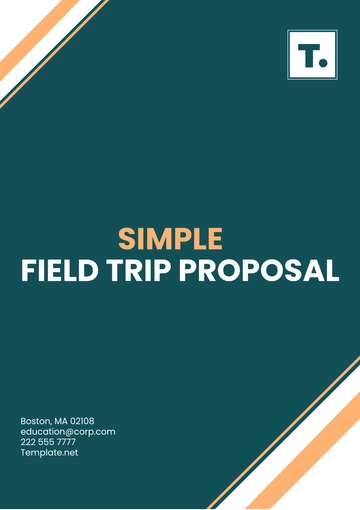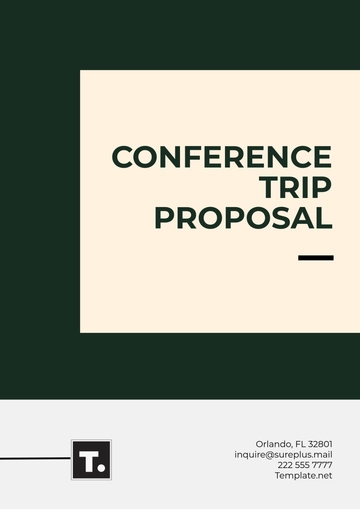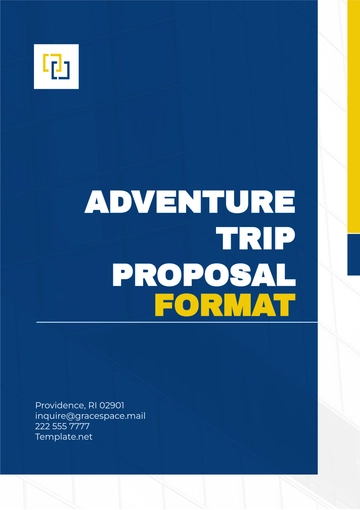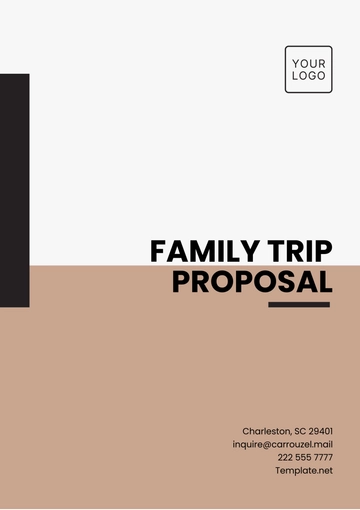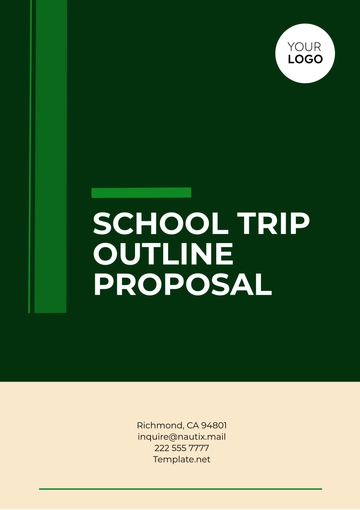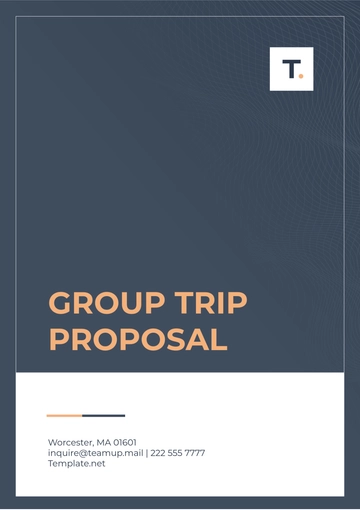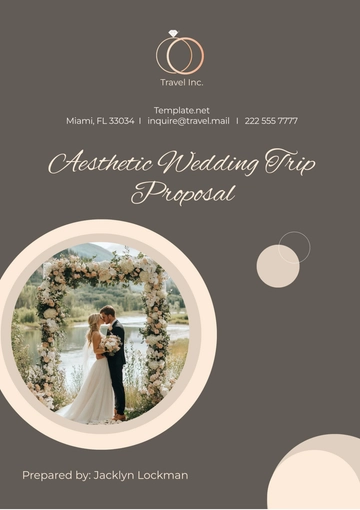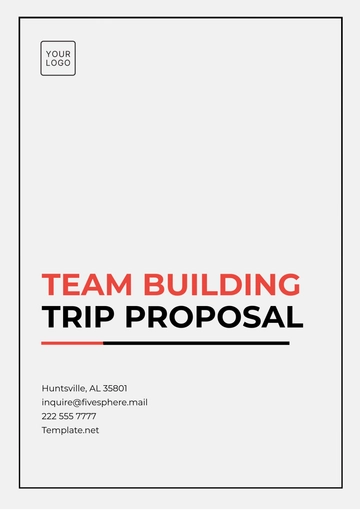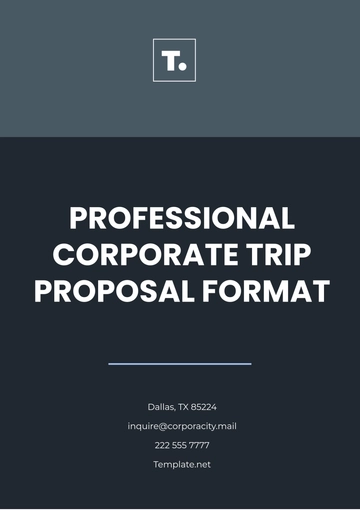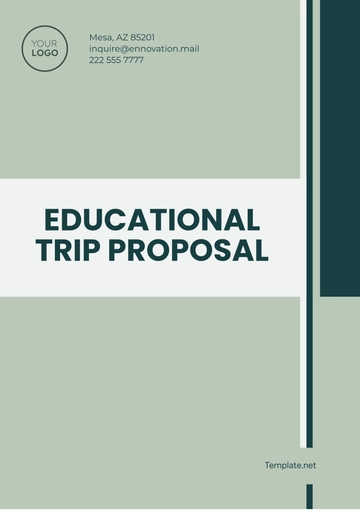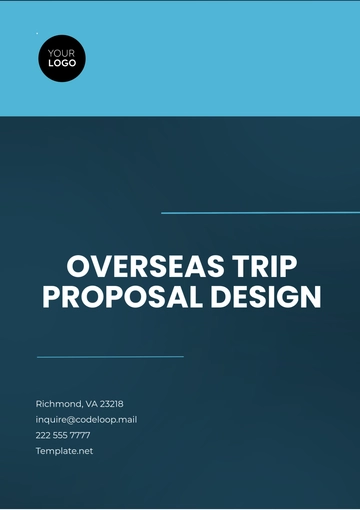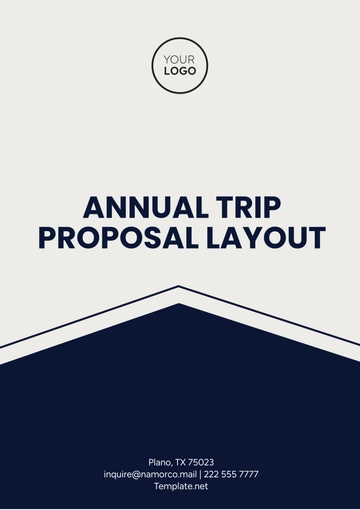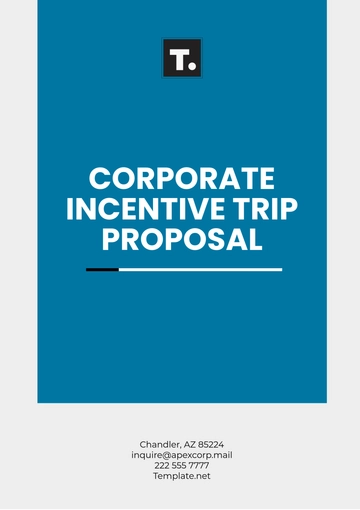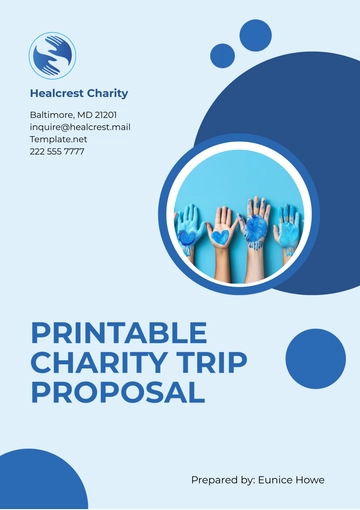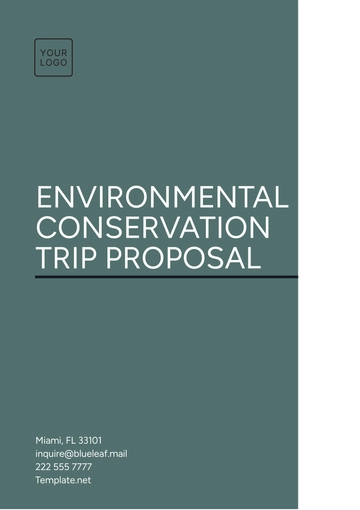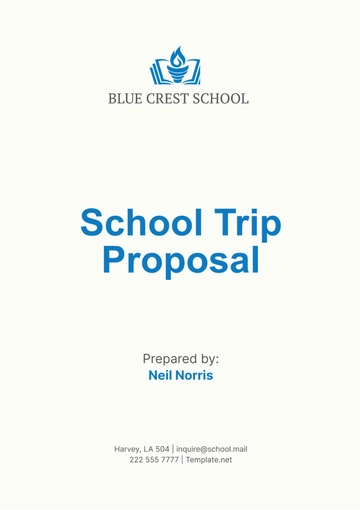Free School Trip Proposal
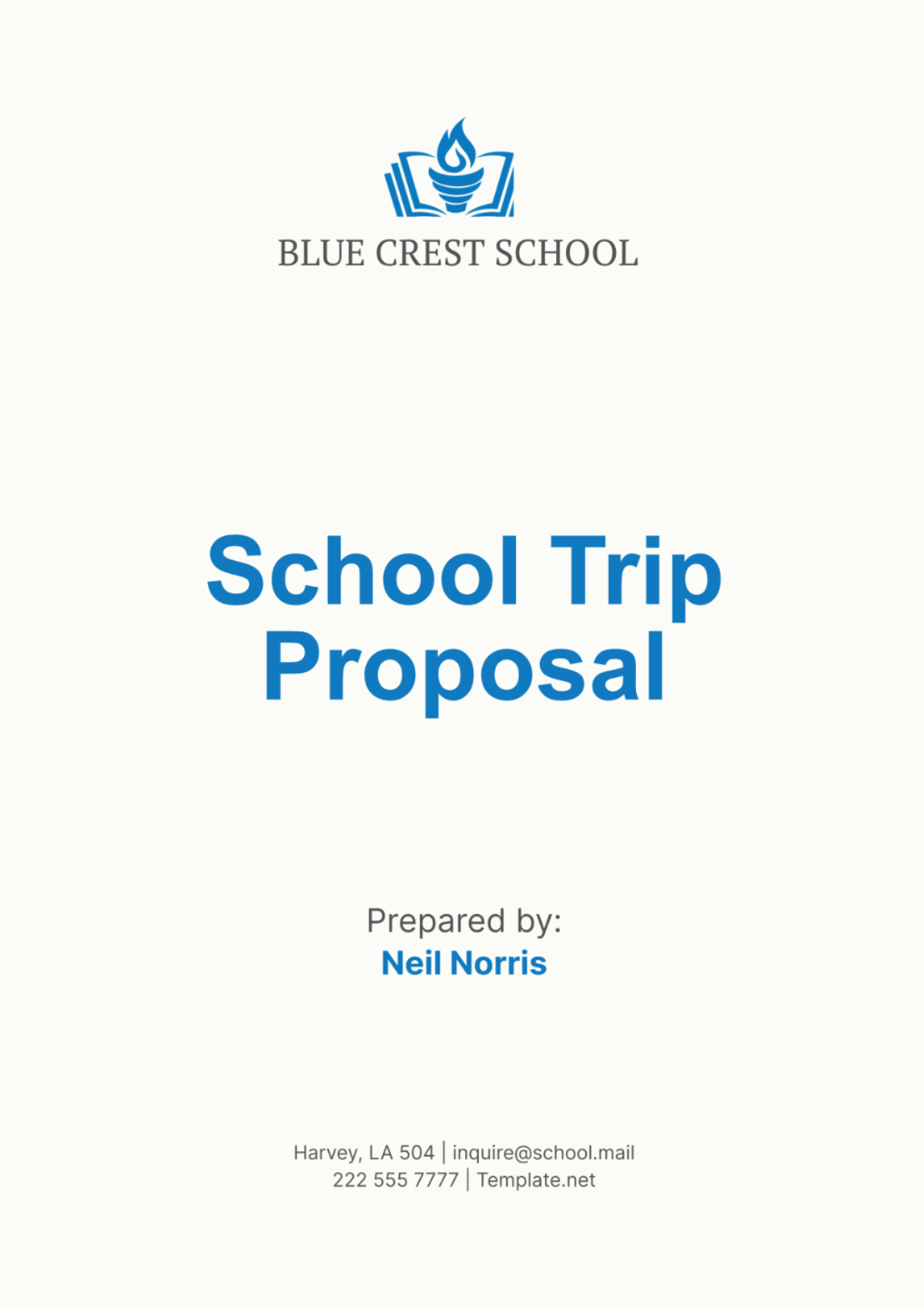
I. Introduction
A. Purpose of the Proposal
This proposal is designed with the intention of significantly enhancing the educational journey of the students at [Your Company Name]. Our objective is to offer an extraordinary learning opportunity that extends beyond the boundaries of the conventional classroom environment. By immersing these students in the rich cultural and historical fabric of [Destination A], we endeavor to cultivate a profound appreciation for [Subject Areas]. This experiential learning approach aims not only to augment their academic knowledge but also to contribute substantially to their personal growth and development. Through this initiative, we hope to provide a multidimensional educational experience that will resonate with students in both their academic pursuits and personal lives.
B. Overview of the Proposed Trip
We have meticulously planned a comprehensive trip to [Destination A], which is intended to last for [0] days. This journey is particularly centered around exploring significant educational sites, including but not limited to [Site 1], [Site 2], and [Site 3]. Throughout the duration of the trip, students will be actively participating in a variety of interactive, hands-on activities and guided tours. These experiences have been carefully curated to align closely with our curriculum objectives, thereby reinforcing the concepts and lessons learned in the classroom through engaging, real-world experiences.
II. Trip Details
A. Destination and Itinerary
Proposed Destination(s)
Destination | Description |
|---|---|
[Destination A] | Known for its rich historical significance as the capital of the United States, providing insights into American government, history, and culture. |
[Destination B] | Features world-renowned museums focusing on natural history, art, and science, ideal for exploring various academic disciplines. |
Detailed Itinerary
Day | Activities |
|---|---|
1 |
|
2 |
|
3 |
|
B. Dates and Duration
Proposed Dates of Travel: Departure on [Date] and return on [Date].
Duration of the Trip: The trip will last [00] days/nights, ensuring ample time for comprehensive exploration and learning experiences.
C. Mode of Transportation
Transportation Details: Students will travel by chartered coach buses equipped with reclining seats, air conditioning, and onboard restroom facilities to ensure comfort during the journey.
Logistics for Travel: Departure from [Your Company Name] will be at [Time], with planned stops for meals and rest breaks. All transportation logistics, including local transfers in [Destination A], will be coordinated by a professional travel agency to optimize safety and efficiency.
III. Educational Objectives
A. Learning Goals and Objectives
Curriculum Alignment
The upcoming journey to [Destination A] will play an essential role in enhancing our students' learning objectives across multiple academic areas, including History, Geography, and Social Studies. By visiting and engaging with significant historical landmarks and cultural institutions that align with our curriculum, students will have the opportunity to gain a more profound comprehension of their studies. This educational excursion is meticulously designed to provide immersive experiences and guided tours, which will enable students to delve deeper into Civil Rights Movement. These hands-on encounters will facilitate a richer understanding, allowing students to connect theoretical knowledge with real-world contexts, thereby enriching their overall educational experience.
Specific Learning Outcomes
Through active engagement with local experts and participation in a series of interactive workshops, students will have the opportunity to develop critical thinking skills and a heightened sense of cultural awareness. This immersive experience will not only sharpen their analytical abilities when examining primary sources and artifacts related to specific topics but will also cultivate a deeper appreciation for diverse global perspectives. As they interact with knowledgeable professionals and delve into hands-on learning activities, students will be equipped to better understand and value the rich, multifaceted nature of our interconnected world.
B. Academic Justification
Relevance to Subjects/Courses
The trip offers a unique opportunity for students to witness the tangible manifestations of American history and government. Visiting the U.S. Capitol, students will understand the structure of government and witness where significant legislative decisions were made that shaped the nation's course. At the [Destination B], artifacts such as the Greensboro Lunch Counter and Rosa Parks' bus highlight pivotal moments in civil rights history, reinforcing lessons on social justice and equality.
Enhancement of Classroom Learning
In addition to acquiring theoretical knowledge, the trip offers a form of experiential learning that cannot solely be achieved within the confines of a traditional classroom setting. During this journey, students will have the opportunity to actively engage with a multitude of diverse perspectives and historical narratives. This immersive experience will significantly enhance their comprehension of democratic principles, various social movements, and the critical role that activism has played in the development and transformation of American society.
IV. Safety and Supervision
A. Student Safety
Safety Measures and Protocols
Throughout the entirety of the trip, an extensive array of safety measures will be put into effect to ensure the well-being of all participants. This will commence with thorough safety briefings before the trip begins, where all important safety information and protocols will be communicated to everyone involved. Additionally, strict adherence to local laws and regulations will be maintained at all times, ensuring that the trip aligns with the legal and safety standards of the region being visited.
Furthermore, there will be regular check-ins with both students and staff to monitor their safety and address any concerns that may arise. In terms of logistics, all accommodations and transportation providers that will be used during the trip will undergo a rigorous vetting process to assess their compliance with safety standards and their overall reliability. This means that only those providers who meet high safety criteria will be selected to ensure a secure and dependable experience for everyone taking part in the journey.
Emergency Procedures
In situations where emergencies may arise, a comprehensive set of guidelines will be provided to all participants to ensure clarity and understanding. These guidelines will cover various critical areas, including communication protocols, procedures for evacuation, and steps for medical response. To facilitate a rapid and efficient reaction to any unexpected incidents, every member of the staff will participate in extensive training sessions. These sessions will be focused on equipping them with essential skills such as first aid and emergency management. The primary objective of this training is to ensure that staff members are well-prepared to address and manage any unforeseen circumstances swiftly and effectively, thereby ensuring the safety and well-being of all individuals involved.
B. Supervision Plan
Staff-to-Student Ratio
A dedicated team consisting of [00] highly experienced teachers and chaperones will be maintaining a carefully planned ratio of [0:00] to ensure that each student receives personalized attention and appropriate supervision. Each member of the supervisory team will be specifically assigned distinct roles and responsibilities. These will include the crucial tasks of monitoring and managing student behavior to foster a positive environment, facilitating meaningful group discussions to enhance learning and engagement, and providing necessary academic support tailored to individual student needs whenever required.
Roles and Responsibilities of Supervisors
Prior to the trip, all supervisors will be required to complete comprehensive background checks as well as attend a series of training sessions. These steps are crucial to ensure that the supervisors are thoroughly prepared and well-equipped to manage and respond to a wide range of possible scenarios that may arise. The responsibilities of these supervisors will be multifaceted, encompassing several key roles. Firstly, they will be tasked with promoting and maintaining the safety of all students throughout the duration of the trip. In addition to ensuring safety, they will also be responsible for enforcing the rules and guidelines established for the trip, thereby ensuring that all participants adhere to the expected standards of behavior.
Furthermore, the supervisors will play a pivotal role in fostering a positive and supportive learning environment. This environment is intended to encourage curiosity among the students and actively engage them in the educational opportunities presented by the trip. By fulfilling these roles, the supervisors will contribute significantly to making the trip a safe, orderly, and enriching experience for everyone involved.
V. Budget
A. Cost Breakdown
Transportation Costs
The estimated transportation budget encompasses a variety of components, including the costs associated with round-trip fares by the specified mode of transport, which could be airplane, train, bus, or any other relevant option. Additionally, included in this budget are expenses for airport transfers, ensuring that travelers can conveniently move between the airport and their accommodations or other destinations. The budget also covers local transportation within the designated destination, [Destination], which involves costs for taxis, buses, trams, subways, or other relevant local transit options. The total estimated budget for all these transportation needs comes to [$ 000].Furthermore, in calculating this budget, special considerations have been meticulously accounted for. These include potential discounts available for group travel, which can significantly reduce per-person costs.
Additionally, the budget takes into account seasonal pricing fluctuations, recognizing that travel costs vary depending on the time of year. Such fluctuations could be due to high-demand travel seasons, holidays, or other factors that influence transportation prices. All these considerations ensure that the transportation budget is comprehensive and realistic, aiming to provide a thorough estimate for all foreseeable expenses.
Accommodation Costs
The expenses for lodging at [Name of Hotel] will encompass a stay of [00] nights. The accommodations have been selected with specific attention to their close proximity to educational sites, ensuring easy access for participants. Furthermore, these accommodations have been chosen based on their impressive safety features, providing a secure environment for all guests. The total cost for this lodging arrangement amounts to [$ 000].
Meals and Incidentals
With a budget allocation of [$ 000], the meal expenses are anticipated to cover the cost of providing [00] meals each day for every student, which includes breakfast, lunch, and dinner. Furthermore, this financial plan also accounts for miscellaneous expenses, which encompass entry fees to various museums, charges for guided tours, and the costs associated with cultural experiences.
B. Funding Sources
School Budget Allocation
An amount of $100,000 has been allocated from the school's annual budget to support educational trips. This financial commitment highlights our dedication to enriching students' educational experiences by providing opportunities for learning that extend beyond the conventional classroom environment.
Fundraising Activities
To supplement our current funding, we will undertake a comprehensive series of fundraising activities designed to meet our financial needs. These initiatives will include bake sales where community members can purchase homemade treats, community outreach events aimed at engaging local residents and raising awareness, and efforts to secure corporate sponsorships that can provide substantial financial backing. The target for these fundraising efforts is set at [$ 000]. This amount has been carefully calculated to ensure not only that all students who wish to participate will have the financial means to do so, but also to cover any unexpected expenses that may arise during the trip.
VI. Parental Consent and Support
A. Communication Plan
Information Sessions or Meetings
Before the planned trip takes place, a series of informational sessions will be organized specifically for the parents and guardians of the participating students. The purpose of these sessions is to provide detailed information about various aspects of the trip, including the complete itinerary, the safety measures that will be put into place to ensure the well-being of the students, and the educational objectives that the trip aims to achieve. Additionally, these sessions will serve as a forum where parents and guardians can ask any questions they might have and address any concerns.
Parental Information Packets
We will ensure that information packets, which will encompass a comprehensive trip overview, a detailed itinerary, a packing list, and necessary consent forms, are distributed to parents and guardians well ahead of time. This careful dissemination of materials is intended to maintain a high level of transparency in our communications and to provide ample time for families to thoroughly prepare for their child's involvement in the trip.
B. Consent Forms
Distribution and Collection
Consent forms will be made available both in electronic format and as physical hard copies to ensure accessibility. Each form will clearly state a specific deadline for submission, which has been designated as [Date]. It is imperative that all completed forms be returned to [Staff Member] to secure the necessary parental approval and to confirm the participation of the student in the activity or program.
Deadline for Submission
The deadline for the submission of consent forms is [Date]. This deadline is carefully chosen to allow for a sufficient period in which we can thoroughly process all the submitted forms. Furthermore, this will enable us to finalize the necessary travel arrangements well in advance. Additionally, having this ample time frame ensures that we are able to address and respond to any remaining questions that parents or guardians might have concerning the arrangements or any other related matters.
VII. Approval Request
A. Approval Needed
Authorization from School Administration
Approval is requested from [Principal/Headmaster] to proceed with the educational trip to [Destination]. This trip aligns with our school's mission to provide enriching educational experiences and is supported by detailed planning, curriculum alignment, and safety protocols.
Board Approval
Board approval is also sought to ensure compliance with school policies and regulations governing student travel and educational excursions. The proposal emphasizes the trip's educational value, safety measures, and financial planning to secure necessary approvals.
B. Timeline for Approval
Submission Date
The completed proposal and accompanying documents will be submitted to [Principal/Headmaster] by [Date], allowing ample time for review and consideration.
Expected Decision Date
We anticipate a decision on approval to be made by [Date], enabling us to finalize logistical arrangements, confirm participant numbers, and communicate trip details to parents and students promptly.
VIII. Appendices
A. Supporting Documents
Sample Itinerary: Detailed day-by-day itinerary outlining educational activities, sightseeing opportunities, and free time for exploration.
Risk Assessment Forms: Completed forms assessing potential risks and outlining mitigation strategies to ensure student safety during the trip.
B. Letters of Support
Endorsements from Relevant Stakeholders: Letters of support from teachers, parents, and community members endorsing the trip's educational benefits and safety measures.
Testimonials or Feedback from Previous Trips: Positive feedback and testimonials from students, parents, and staff who have participated in similar educational trips organized by [Your Company Name].
- 100% Customizable, free editor
- Access 1 Million+ Templates, photo’s & graphics
- Download or share as a template
- Click and replace photos, graphics, text, backgrounds
- Resize, crop, AI write & more
- Access advanced editor
Simplify your school trip planning with the School Trip Proposal Template from Template.net. This editable and customizable template features an intuitive AI Editor Tool, allowing seamless customization to fit your school's unique needs. Craft detailed itineraries, safety protocols, and budget breakdowns effortlessly. Streamline approval processes and enhance educational experiences with this versatile tool.
You may also like
- Business Proposal
- Research Proposal
- Proposal Request
- Project Proposal
- Grant Proposal
- Photography Proposal
- Job Proposal
- Budget Proposal
- Marketing Proposal
- Branding Proposal
- Advertising Proposal
- Sales Proposal
- Startup Proposal
- Event Proposal
- Creative Proposal
- Restaurant Proposal
- Blank Proposal
- One Page Proposal
- Proposal Report
- IT Proposal
- Non Profit Proposal
- Training Proposal
- Construction Proposal
- School Proposal
- Cleaning Proposal
- Contract Proposal
- HR Proposal
- Travel Agency Proposal
- Small Business Proposal
- Investment Proposal
- Bid Proposal
- Retail Business Proposal
- Sponsorship Proposal
- Academic Proposal
- Partnership Proposal
- Work Proposal
- Agency Proposal
- University Proposal
- Accounting Proposal
- Real Estate Proposal
- Hotel Proposal
- Product Proposal
- Advertising Agency Proposal
- Development Proposal
- Loan Proposal
- Website Proposal
- Nursing Home Proposal
- Financial Proposal
- Salon Proposal
- Freelancer Proposal
- Funding Proposal
- Work from Home Proposal
- Company Proposal
- Consulting Proposal
- Educational Proposal
- Construction Bid Proposal
- Interior Design Proposal
- New Product Proposal
- Sports Proposal
- Corporate Proposal
- Food Proposal
- Property Proposal
- Maintenance Proposal
- Purchase Proposal
- Rental Proposal
- Recruitment Proposal
- Social Media Proposal
- Travel Proposal
- Trip Proposal
- Software Proposal
- Conference Proposal
- Graphic Design Proposal
- Law Firm Proposal
- Medical Proposal
- Music Proposal
- Pricing Proposal
- SEO Proposal
- Strategy Proposal
- Technical Proposal
- Coaching Proposal
- Ecommerce Proposal
- Fundraising Proposal
- Landscaping Proposal
- Charity Proposal
- Contractor Proposal
- Exhibition Proposal
- Art Proposal
- Mobile Proposal
- Equipment Proposal
- Student Proposal
- Engineering Proposal
- Business Proposal
